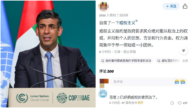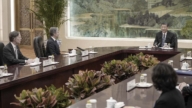【新唐人2014年01月01日讯】中国社科院日前发布《社会蓝皮书》指出,大约300名全国性的“意见领袖”影响着互联网,他们在网路上的影响力超过媒体和政府。评论认为,中国民众对自由言论的倾向和追求,让中共极度恐慌。
中国社科院发布的《社会蓝皮书:2014年中国社会形势分析与预测》中,有关互联网舆论的部分指出,在中共这次互联网整治中,一些“大V”名人被清理,但网路“意见领袖”仍存在。
《蓝皮书》说,中国共有103家微博客网站,用户账号总数达到12亿,其中1万 9000个账户的粉丝超过10万,3300个账户的粉丝超过100万,有200个账户的粉丝超过1,000万。
他们中大约有300名全国性的“意见领袖”,主导着网上舆论,当中有29人出自党政军系统,120人有过体制内职业经历。
如,知名网友“十年砍柴”,曾工作于国家某部委,因国务院机构精简分流到媒体,后成为独立专栏作家和网路名人。
这些人当中,绝大多数生活在一线大城市,在北京的占63%,男性占90%,上世纪50年代到70年代出生的占83%。他们的影响力主要体现在微博上,部分人的影响力超过媒体和政府。
而多数“意见领袖”从二线区域闯入一线城市,对草根社会的观察和体验有切肤之痛,他们的个人经历对年轻人也有吸引力。
中共喉舌《人民网》舆情监测室12月30号分析说:网路“意见领袖”在一定程度上成为民意的代言人,对政府陈情,施加舆论压力。分析建议,客观评估他们的建设性和合作精神,用中共“统一战线”手法去团结包容他们,减少他们对体制的对抗性。
而北京时政观察人士华颇指出,对中国舆论起主导作用的远不止300名网路“意见领袖”,许多中国百姓对中共体制的强烈不满,不是用“统战”手法能解决的。
北京时政观察人士华颇:“这是官方的一种无奈,再者,对网路的整治,只是一个取得阶段性成果,还要‘宜将胜勇追穷寇’,(中共当局)对网络存在的这些‘大V’来讲,还要继续的整肃,绝不能半途而废。”
时事评论员邢天行指出,西方国家的互联网比中国发达,但是西方媒体的话语权,并没有被互联网取代。而中共用一言堂控制舆论导向,才引发中国民众的反感。
时事评论员邢天行:“你越是那样钳制声音,那么你越是遭到抛弃了,而在西方国家它不存在这个问题,所以它不管互联网怎么发达,它都不可能取代主流媒体的作用,因为它那个主流媒体一向都是民众有什么声音,什么权利的要求,它都要在那上去发声的。”
邢天行指出,民众对自由言论的倾向和追求,让中共极度恐慌,中共怕会动摇它的地位,或者动摇了影响力。
中共“十八大”后,新领导人高唱反腐,中国网路上也掀起了反腐浪潮,网民们实名举报了一大批中共贪官、淫官、表(表)哥、表(表)叔等,民间要求“官员财产公示”的呼声,更是一浪高过一浪。
但是,2013年8月,中共当局以打击所谓“网路谣言”为名,短短几天内抓捕了数以千计的网路活跃人士。网路“大V”薛蛮子被刑拘,罪名却是“嫖娼”。9月10号,“两高”—-最高法院和最高检察院再出台恶法,所谓“诽谤信息”被转发500次可判刑。
华颇认为,目前中国社科院发布的这个《蓝皮书》,就是呼吁中共对网路打压、封杀还要继续,还要加强,不可放松。
华颇:“‘防民之口甚于防川’这是古训,我想这种打压的后果是非常严重的,可以说它可以取一时之功效,但是长远来讲,对官方来讲危害是巨大的,不是那句话吗?不在沉默中死亡,就在沉默中爆发。”
华颇指出,等到人们对中共积怨积压到一定程度之后,人民就会揭竿而起,最后倒霉的是中共本身。
采访编辑/李韵 后制/陈建铭
China Internet Opinion Leaders Continue to Concern Regime
The Chinese Academy of Social Sciences recently
highlighted in the “Social Blue Book” that around
300 national opinion leaders have more influence
on the internet than the media and government.
Commentators consider that the Chinese people ‘s pursuit
is of deep concern for the Chinese Communist Party (CCP).
The Chinese Academy of Social Sciences
has published it ‘s “Social Blue Book: 2014
Society of China Analysis and Forecast.”
In the section on internet public opinion, it says
that although some prominent netizens have
been silenced, internet opinion leaders still exist.
The Blue Book said that China has 103 Chinese
micro-blog websites, and 1.2 billion user accounts.
Among those users accounts, there are 19,000
accounts who have fans of over 100,000 fans.
There are 3,300 accounts with 1 million fans,
and 200 accounts with over 10 million fans.
In addition, among these accounts, there are about 300
national opinion leaders dominating online public opinion.
29 people are from government and military systems, and
120 people having professional experience in the system.
For example, well-known netizen called
“10 years woodcutter” worked in a ministry.
They then became an independent columnist
and internet celebrity in the media.
This was through state council institutional reforms.
Among these people, the majority live in first-tier big cities.
63% live in Beijing, 90% are male, and 83%
were born between the1950s and 1970s.
Their influence is mainly in micro-blogging, with some
having greater influence than state media and the regime.
The majority of opinion leaders from second-tier
cities have experienced and witnessed deep suffering
at grass-roots levels, which speaks to young people.
On December 30, the CCP mouthpiece People’s Daily
public opinion monitoring room released a commentary.
To some extent, internet “opinion leaders" become public
spokespersons to petition the government and exert pressure.
The People ‘s Daily suggested using CCP “united front"
tactics to accommodate them, after there has been an
assessment of their ‘constructive and cooperative spirit’.
This, it stated, will reduce their antagonism with the system.
Beijing current affairs expert Hua Po, says that
it is not only the 300 online celebrities who play
the main role influencing public opinion in China.
Many Chinese civilians are strongly
dissatisfied with the CCP system.
This cannot be resolved by
using any “united front” method.
Hua Po: “This is kind of helplessness from the CCP.
What has been done through cracking down on
internet expression is just a short-term solution.
They will continue.
The CCP will carry on purging influential
bloggers, and will not stop half way.”
Current affairs commentator Xing Tianxing says that
Western countries ‘internet is more advanced than in China.
However, freedom of expression
wasn ‘t improved through the internet.
The CCP ‘s ‘one-voice rule ‘ controls
the direction of public opinion.
Thus, it continues to provoke public resentment.
Xing Tianxing: “The more the CCP controls freedom
of expression, the more the regime is renounced.
In Western countries, this problem is seen far less.
No matter how advanced social networks develop,
it couldn’t replace the role of mainstream media.
This is because public voices and rights are
able to be heard through mainstream media.”
Xing says that the public persist in seeking
their right for freedom of expression.
This continues to concern the CCP,
that it’s influence and power will be lost.
After the CCP 18th National Congress, the
new leadership vowed to fight corruption.
The internet began to vigorously echo this action.
Netizens reported on large numbers of corrupt officials.
Voices calling for the disclosure of officials’ continue
to be a strong feature of internet discussions.
In August 2013, the regime arrested thousands of online
activists, in the name of cracking down on “online rumors”.
This included the detention of influential blogger
Xue Manzi, under allegations of “hiring prostitutes”.
On September 10, the Supreme Court and Supreme
Procuratorate jointly introduced new measures.
It claimed that if a message is reposted over 500
times, the author will face arrest and imprisonement.
Hua Po says that the Blue Book suggests the
CCP will not ease suppression on the internet.
On the contrary, censorship will
be continued and strengthened.
Hua Po: “The ancient saying goes that it will
cause more harm to stop the free flow of
people’s thoughts, than to stop that of the rivers.
I think the outcomes of this suppression is serious.
It likely can be maintained in the short-term, but
in the long-term,it is very harmful for the regime.
Isn ‘t it a saying, to explode
in the silence or to die in it.”
Hua Po says that once complaints accumulate
to a critical point, people will uprise, and the
CCP will begin to suffer the consequences.
Interview & Edit/LiYun Post-Production/Chen Jianmin





























